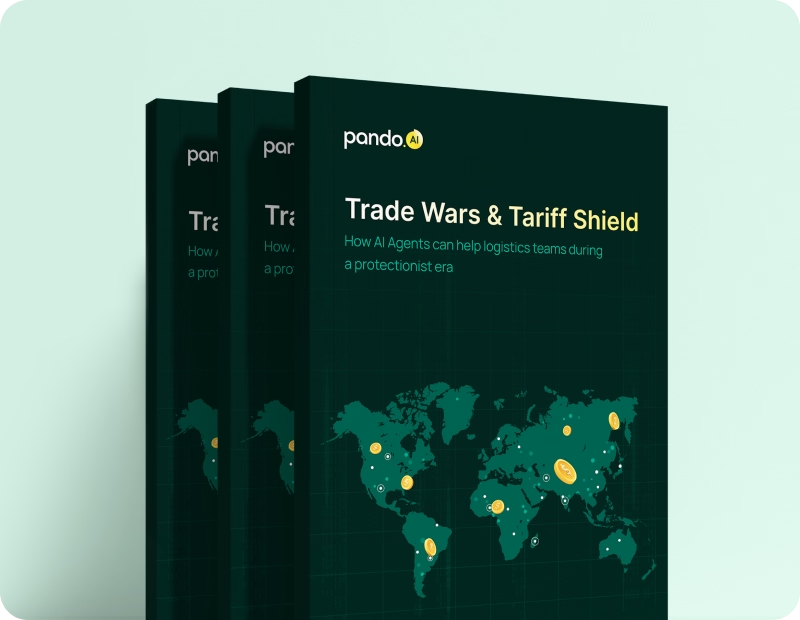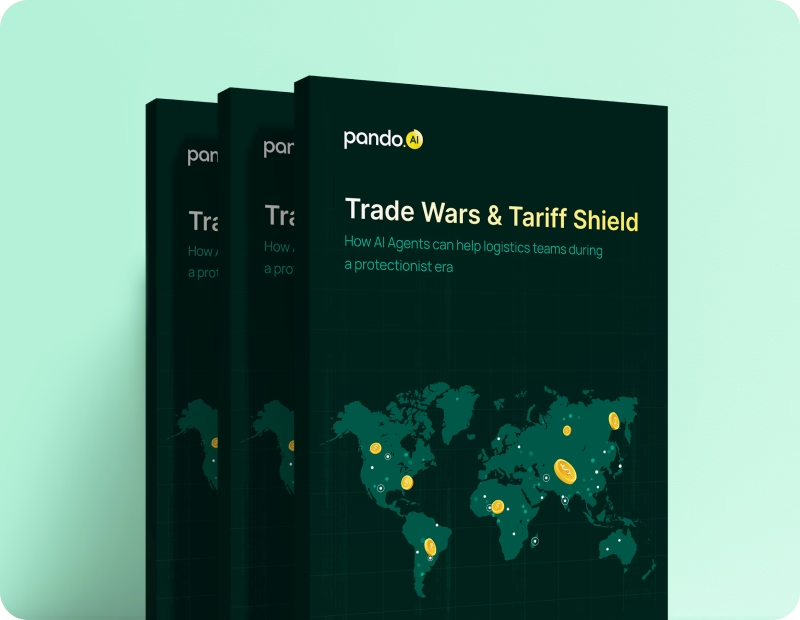-
Products Products
- Industry
- Initiatives
- Resources
- Company
- Book a demo
-
Products Products
- Industry
- Initiatives
- Resources
- Company
- Book a demo
TMS solutions: Guide for streamlining modern logistics and transportation
Learn why you need a comprehensive TMS solution to handle all the nuances of procure-to-pay freight management processes.
Published on August 15, 2024 • 9 mins read
Rohit Lakshman

Learn why you need a comprehensive TMS solution to handle all the nuances of procure-to-pay freight management processes.
Can you deny that manual and paper-based methods of freight management aren’t synonymous with a nervous breakdown? If a mismatch occurs in day-to-day sourcing and payment, you can realize the chaos down the logistics networks. There are too many loopholes in manual freight management, with millions and even thousands of millions of bottom-line impact. As businesses grow, the scale and complexity around pay-to-procure only double, which requires efficiency for supply chain visibility and unified data-driven decisions.
Connected transportation that supports greater control, visibility, and business process efficiency allows for end-to-end transportation management and facilitates modern logistics. A comprehensive TMS solution fulfills these ambitions. With integrated TMS features, transportation management software drives operational efficiency, streamlines overwhelming workflows, improves connectivity, and boosts cost efficiency.
Let’s explore what essential TMS features are must-haves for maximum productivity gains and logistics efficiency.
What is a TMS solution?
A TMS solution is a comprehensive application that manages end-to-end transportation activities or handles the entire procure-to-pay life cycle of transportation to support the inbound and outbound shipment of goods across the supply chain.
TMS or transportation management systems provide support for the following processes:
-
Transport sourcing and procuring: Helps secure freight capacity with optimal bid workflows.
-
Transport planning and execution: Enables intelligent load planning, capacity optimization, and freight shipment.
-
Logistics automation: Provides greater visibility on the movement of goods and risk prevention.
-
Transportation analytics: Provides real-time data to improve logistics performance and shipment efficiency
A holistic TMS solution is designed to support scalability. Whatever critical processes may come, you can streamline vital supply chain operations and unlock essential benefits.
Why is a TMS solution so critical?
Your current system may be clunky and highly unlikely to improve process efficiency. A TMS is critical to navigating the challenges of functional silos across the logistics networks and help unlock tangible business values. Here is why you should use a TMS:
-
Improved visibility: AI/ML-driven TMS solutions build a single source of truth for all stakeholders to facilitate shorter lead times, faster delivery, and greater customer experiences.
-
Cost control: TMS solutions automate manual processes and boost cost-efficiency by optimizing freight capacity, reducing empty miles, and paying only for services rendered.
-
Agility and efficiency: Logistics automation embedded in TMS unifies data to automate workflows for existing or new use cases and streamline intricate processes for better efficiency and supply chain agility.
-
Data-driven decisions: TMS ensures you can gain advanced data analytics and insights to improve freight procurement and carrier management decisions while also streamlining transportation activities.
As you tend to harness these benefits, you must consider comprehensive TMS features to manage the nuances of transport management in the supply chain.
8 essential features to look for in a TMS solution
Procure-to-pay for freight management can be intimidating. It is feasible to prioritize TMS features based on functional and platform capabilities. This approach makes it easy to select TMS solutions specific to your business needs to drive supply chain productivity and efficiency.
Functional Capabilities
1. Freight Procurement
A comprehensive TMS solution can facilitate the following objectives.
-
-
Freight sourcing
A TMS solution's intelligent freight sourcing feature uses AI to build automated quotation workflows based on historical patterns and help develop bid projects. It reduces overheads and gives you better flexibility to negotiate prices and collaborate with the best carrier pool.
-
Digitized rate management
Freight management software like TMS provides a digitized rate manager engine that digitizes all your freight contracts. This helps you automate contract renewal for expiring lanes and manage fluctuating accessorial charges to anticipate final shipping costs.
-
Automated procurement events
With a transportation management system, you can gain complete control over the procurement lifecycle by automating the negotiation of carrier contracts, pricing, and terms, initiating procuring transportation as needed, and renewing or terminating an existing contract.
-
2. Transportation Planning
A freight management software system meets the following purposes for logistics:
-
- Order consolidation
With intelligent logistics technology used in TMS solutions, you can seamlessly manage the nuances of order consolidation. You can combine orders into one shipment based on carrier availability and optimize freight capacity for reduced shipping costs and supply chain efficiency. - Multi-modal planning
Leverage multi-modal planning in a TMS solution. It eliminates all bottlenecks in global shipping regarding regions, languages, taxes, and currencies, automates end-to-end document management for transportation (road, air, ocean, and rail), and maintains compliance. - Back-haul planning
An integrated TMS solution encourages cost efficiency by eliminating empty miles. With end-to-end visibility into warehouse management systems, transportation management software allows you to schedule pickups for returns with trucks on backhaul movements. This saves you costs and optimizes your freight resources. - Route optimization
As reported by Gartner, 60% of suppliers claimed that they lack supply chain visibility and resist resilience. Thanks to TMS solutions, which improve visibility across logistics and help avoid routes susceptible to future risks, they recommend the most efficient routes to reduce transit times, save on fuel costs, optimize driver engagement, and enable real-time fulfillment.
- Order consolidation
3. Transportation Execution
With a TMS solution, you can control the following workflows:
-
- Carrier tendering
A TMS solution builds a unified platform to support automated tendering processes. It helps you submit a tender, select contracted carrier vendors and transportation modes, and secure a procurement. You can also leverage spot buys with non-contracted vendors for sudden spikes in demand. - Real-time tracking and visibility
The lack of visibility means your shipment can be susceptible to theft, damage risks, and other vulnerabilities. Ensure you have real-time tracking and visibility features in the TMS solution. It is essential to monitor the end-to-end activity of the shipment in transit, track every milestone, prevent potential disruptions ahead of time, and ensure ETAs. - Document management
AI/ML-powered TMS solutions automate document creation and management workflows with accurate shipping details, such as transport modes, shipment size, delivery location, and ETAs. This ultimately helps auto-create proforma invoices once a shipment is delivered. - Sustainability reporting
The Global Carbon Emission Index reports a 15.2% increase in carbon emissions from Q1 2023 to Q4 2024. The future target is to cut GHG emissions to zero by 2050. Sustainability reporting is an excellent feature in the TMS system to help you calculate carbon emissions accurately, comply with global standards, and meet sustainability expectations.
- Carrier tendering
4. Freight Audit & Payment
TMS solutions make the following processes seamless.
- Automated freight audit - A powerful TMS solution must support four-way matching capabilities across procure-to-pay, which automates audit trails based on shipment data, purchase orders, invoices, and proof of delivery. Improved audit accuracy facilitates automated payments for claim and dispute management.
- Shipping costing and accruals - A TMS solution prepares you better to handle your freight budget. By leveraging AI/ML-driven predictive freight accruals with integrated shipping costing, you can anticipate transportation expenses before accounts payable invoices come from your carriers and drive better cashflows.
Platform Capabilities
5. Carrier Collaboration ( Unified Platform)
A TMS solution efficiently helps build a unified platform to collaborate with carrier networks across multi-modal shipments. With improved visibility, TMS enables you to prevent discrepancies, avoid shipment issues, and optimize inventory management for optimal utilization of fleet services.
6. Business Analytics
A robust transportation management system enables you to harness powerful business analytics, which helps with transportation forecasting in tandem with future demands. Predictive analytics help detect logistics risks to prepare contingency plans, while market intelligence improves carrier selection with preferred attributes.
7. Automation and AI
Your TMS software must embrace automation and AI to streamline manual processes and reduce workloads for increased efficiency and productivity. AI Copilot is a new-age generative intelligence that automates decision-making across the freight procure-to-pay cycle to drive significant productivity and decision accuracy.
8. Integration capabilities
Your TMS solution must integrate with business-critical applications such as warehouse management systems, ERP, CRM, etc. Harnessing real-time data analytics allows you to detect demand and optimize inventory management to avoid stockouts or overstock by efficiently managing shipments.
Embrace holistic TMS solutions for modern logistics
Global supply chain operations are no less than a tough battle. They are full of uncertainties and nuances. Transportation management system software allows you to transition to modern logistics by increasing process efficiency and productivity. With essential TMS features, you can automate a plethora of workflows on the pay-to-procure life cycle and gain a competitive advantage. Hence, TMS solutions are not nice to have but must-haves.
To learn more, explore TMS advantages for supply chain efficiency on Pando.
Subscribe to Pando blog and Crossroads newsletter now!
Stay up to date with the latest logistics, transportation, and supply chain tips and news.
Subscribe Here!

Related blogs
Building competitive advantage: How TMS solution transforms your business to offer a differentiated customer experience

Top 10 things to consider when choosing a transport management system – Part 1











